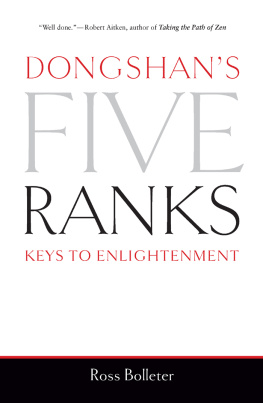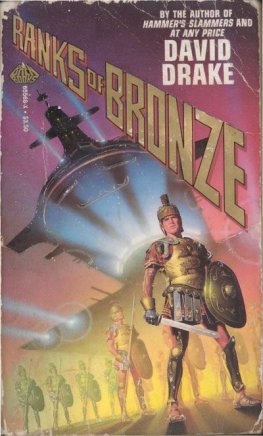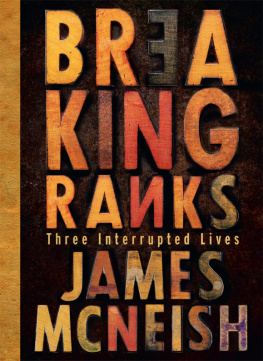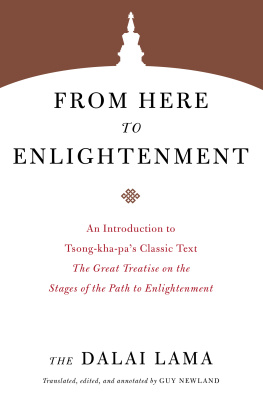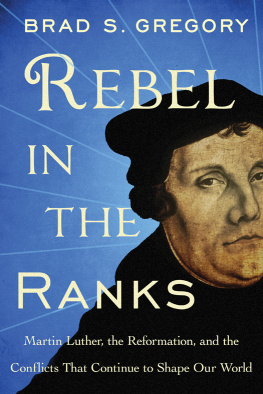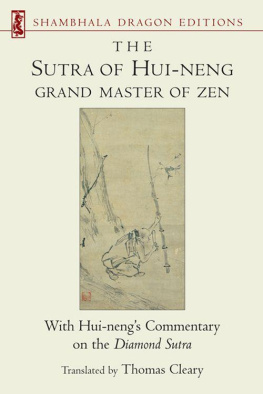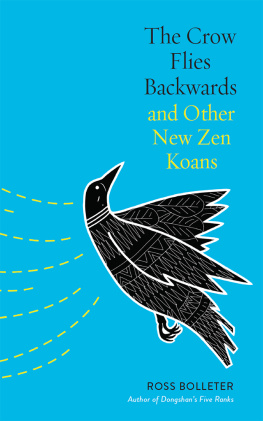DONGSHANS FIVE RANKS

W E IMAGINE OURSELVES and the universe to be distinct, but within us glimmers the suspicion that we are in fact intimately connected and inseparable from all that there is. The dawning and expansion of such awareness is called enlightenment. In his masterworka suite of dialectical works known collectively as the Five RanksDongshan, a Zen master of Old China, approaches enlightenment from five angles, using paradox and poetry to lay out a multifaceted path whereby we might discover enlightenment within this very moment.
Approaching the Five Ranks from a rich and sophisticated koan perspective, Ross Bolleter Roshi augments his explanations of the works with liberal doses of humor and storytelling, bringing this esteemed classic to life. The Five Ranks encourage us to transcend naive individualism and to bring our best qualities of compassion and wisdom intimately into our daily lives.
The first in-depth English commentary on the Five Ranksa core text of the Zen tradition that teaches what cant be taughtwhich contains new translations of all of the key texts of the Five Ranks cycle.

Painstakingly thorough and reliable. Be warned, this vibrant, loving exploration of the country of the Way is likely to draw you into setting out on the great adventure for yourself.Susan Murphy, author of Upside-Down Zen
R OSS B OLLETER is a Zen teacher in the Diamond Sangha tradition teaching in Australia and New Zealand. He trained with Robert Aitken and John Tarrant and received transmission from them in 1997. He is a composer with numerous CD releases, especially in the field of ruined piano.
Wisdom Publications
199 Elm Street
Somerville MA 02144 USA
www.wisdompubs.org
2014 Ross Bolleter
All rights reserved.
No part of this book may be reproduced in any form or by any means, electronic or mechanical, including photography, recording, or by any information storage and retrieval system or technologies now known or later developed, without permission in writing from the publisher.
Library of Congress Cataloging-in-Publication Data
Bolleter, Ross, author.
Dongshans Five Ranks : Keys to Enlightenment / Ross Bolleter.
pages cm
Includes bibliographical references and index.
Includes translations from Chinese.
ISBN 978-0-86171-530-5 ISBN 0-86171-530-6 (pbk. : alk. paper) ISBN 978-1-61429-131-2 (eBook)
1. Liangjie, 807869. Wu wei. 2. Caodong (Sect)Doctrines. 3. Enlightenment (Buddhism) I. Liangjie, 807869. Wu wei. English. II. Title. III. Title: Keys to Enlightenment.
BQ9449.L524W8833 2014
294.385dc23
2013043113
18 17 16 15 14
5 4 3 2 1
Cover and interior design by Gopa&Ted2, Inc.
for Amanda and Julian

Contents


M Y LIFE AS A MUSICIAN has been informed and shaped by Zen practice. In fact, much of the music that I have created would have been unthinkable without it. In saying this, I speak for the power and virtue of zazen, whose effects are incalculable. Beyond that, metaphors of the Way have often been an inspiration for the structures and procedures in my compositions.
I discovered Beethovens Piano Sonata no. 30, op. 109, in the midst of the squalor and emotional chaos of my teen years, and I found in it a luminous principle of order: a music that carried me into a deeper life and gave me my first remembered experience of timelessness. Years later I discovered John Cages book Silence with its Zen influenced account of sound as silence. Under the spell of his Sonatas and Interludes for Prepared Piano in the early 1980s I prepared a piano, inserting a variety of objects such as guitar jacks, postcards, fishing sinkers, combs, clothes pegs, and erasers between and around the strings to alter the sound of the piano in unheard of ways. By the end of the morning it sounded, to my joy, like a demented gamelan orchestra. Later, when I was making a cup of tea at lunchtime, I accidentally knocked the kettle against the stovetopbrang!and found myself in a state of confused joy. It was somehow no longer me darkly stumbling about, unrestricted.
The sound of the kettle striking the stove evoked my yearning and stirred something deeper than thought. I trusted my experience and proceeded on trust. I had to, for, in the ordinary sense what I was getting into couldnt be known in advance, or even known at all. Through koan work, over time and with persistent effort, I came to appreciate that words themselves, even as they retain their conventional sense, are at the same time beyond considerations of sense and meaning. In this they convey the Way no less than the caroling of magpies and the low hum of the fan with its periodic gathering of harmonics, reminiscent of a slow hymn played over and over on an old electronic organ. The genesis of this book on Dongshans Five Ranks lies in these experiences.
My interest in the Five Ranks has also been furthered by my explorations of ruined piano as a composer and improviser. A piano is said to be ruined (rather than neglected or devastated) when it has been abandoned to all weathers with the result that few or none of its notes sound like those of an even-tempered upright piano. It raises the question, What is a piano? When I discovered a ruined piano in a tractor shed on a West Australian sheep station, my passion for prepared piano and its contrivances gave way to one for pianos prepared by nature: by searing heat, flash floods, and by how far off the stars are.
For me ruined piano belongs with those other dead-end metaphors for emptiness: the stringless lute, the iron flute with no holes. The ruined piano may be evocative of emptiness, but each ruined piano is, at the same time, utterly unique with respect to action and tuning (if we can talk of tuning at all). An F# one-and-a-half octaves above middle C on a West Australian ruined piano in a semidesert environment differs radically from the same note on a flooded piano in a studio four floors below pavement level in Prague.
The ruined piano, abandoned in nature, becomes intimate with its environment. As its sound board opens wider to show the cloudless sky, and a dusty wisteria clambers over its broken hammers, the piano that is no longer a piano is so open at the edges that everything and everyone can come through, can come in. And they doyapping sheep dogs, trucks revving up, sheep-station owners complaining about the drought, roosters crowing in some out-of-joint timeall of them singing the 108,000 tongues of the Buddha through the empty, dilapidated window of a single long-ringing ruined note. Taking this all together, we can discern three aspects of ruined piano: no-self, uniqueness, and intimate inclusiveness, three characteristics that connect the ruined piano into the feed-stream of the Five Ranks.
In this book I take two approaches to the Five Ranks. The first is straightforwardly descriptive. I employ this approach in the first exploration of the five modes of the essential and the contingent as well as in the history and context for the Five Ranks. Elsewhere, especially in the more detailed treatment of the Ranks, I draw freely on koans, especially in the extended exploration of Dongshans profound and subtle verses.
Next page
